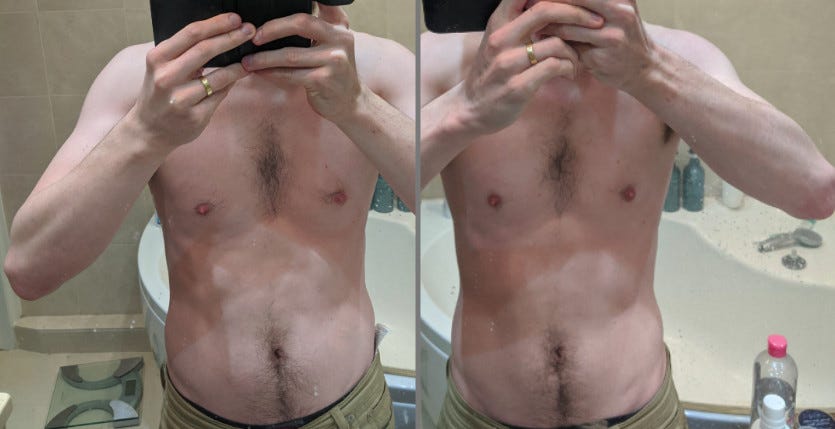At the time of writing (Saturday, January 16th) I haven't eaten in 154 hours and I feel great. This evening I'll pick up my knife and fork for the first time since last Saturday, marking seven full days without a calorie. The only things to have gone down my gullet are water (lots of it), daily vitamin and mineral supplements, and the occasional cup of black coffee.
The surprising thing about water fasting, as it's known, is how easy it is. After a day or two without food your digestive system switches gears, knowing better than to cripple you with hunger when you’ve got hunting to do. With each passing day I've felt less hungry, not more. Yesterday my stomach made so few complaints that I barely remembered I was starving.
But there’s still an obvious question:
Why Bother?
Well for starters, it's been too long since the last time I did something that ordinary people would consider insane. But more importantly: water fasting is thought to provide many health benefits. I don't mean that in the same way that reiki and homeopathy are thought to have health benefits by the illiterate; there's real evidence that periodic fasting helps maintain muscle mass, slows ageing, slows the development of nasty neurodegenerative diseases like Alzheimer's and Parkinson's, reduces your risk of cancer, and more.
It’s how we evolved. Back on the savannah we couldn’t grab a snack from the fridge whenever we felt peckish; on some days we'd spear a gazelle while on others our hunter-gathering would be fruitless. Our stomachs were regularly empty, and that’s when the body ramps up a process called autophagy (awe-TOH-fa-jee), the mechanism by which cells clean out their junk and detritus. Autophagy is a key driver behind the health benefits outlined above, and water fasting is a great way to encourage it.
Obviously if you go too long without food you’ll die, but for the average healthy person this takes at least a couple of months. A week is more than safe.
I did a five-day water fast in 2017 and wrote about it at the time, so I won't repeat myself any further, nor will I repeat myself any further. More importantly, I'm just some random guy with no PhD nor medical expertise, so do your own research and don't take my word on anything health-related. But there's value in self-experimentation, and if you're weird enough for water fasting then I hope the following helps you.
Third Time's a Charm
This was actually my third attempt at a water fast. In 2019 I had a second go and by the morning of day 2 felt so sick - as in "feeling so nauseous I might puke" - that I gave up. And my first, successful fast had some low points, particularly on the third day when I woke up with a crushing hangover-like headache that debilitated me all morning. I also experienced some minor muscle cramps, and even when there was no headache I had some major brain fog and struggled to be productive.
The interesting thing about this time is how much better it’s gone. I woke up with a moderate headache on day 2, but it was nothing like last time and disappeared within an hour of getting up and popping a paracetamol. Other than that everything's been great: not a hint of nausea nor cramps, and not only has there been no brain fog but I've experienced some of the highest levels of mental clarity I can remember feeling. Days four and five were particularly great; it was as if my brain had shifted up into a higher gear that it doesn't normally access. I'd love to know how I can feel that way all the time.
One of the few downsides I’ve experienced (which also happened before) is “keto breath”. Since day 2 I’ve had a sweet, metallic taste in my mouth - a side effect of being in ketosis (the state of burning fat for energy instead of glucose). My wife says I smell of nail polish, and she’s not wrong: one of the main by-products of ketosis is acetone, the active ingredient of nail polish remover. It doesn’t taste good, but it’s become less strong over time, or at least I’m noticing it less.
How to Starve Better
Correlation isn't causation, but I can only think of two things I did differently this time that might explain the better results.
Firstly, this time I took a mineral supplement every morning. Mineral deficiencies are a common hazard on a water fast as you’ll flush out micronutrients when you pee, which you’ll be doing a lot if you’re drinking enough water. From what I've read, magnesium and potassium are the most important ones to replenish. Supplementation is the most likely explanation for why I got no cramps, brain fog, or serious headaches this time.
The other difference was what I did before fasting. That is, I ate as cleanly as possible, following Whole30 rules (no grains, gluten, added sugar, alcohol, dairy; none of the fun stuff) for at least a week before my final meal. I wasn’t eating Burger King before my previous fasts but I doubt I was eating particularly healthily either, nor was I entirely avoiding alcohol. Maybe that’s why I got sick the second time? I’m not sure, but if you're going to switch your digestion off then you should probably be mindful about what exactly you want lingering around in your stomach all week.
I don’t know how much difference this really makes, but it can’t hurt to be safe. As a wise man once said: stay clean.
One final, minor thing: reading my previous blog post reminded me that on my first fast I suffered from very dry and chapped lips. This time around I avoided it by applying lip balm regularly from day one. So I recommend that too.
Fasting for Weight Loss?
I’ve lost about 5 kilos (~11 pounds) this week. I'd read that a non-trivial fraction of the weight you lose when fasting is mere "water weight", but what does this mean?
My (again, non-expert) understanding is that when the body has more glucose than it immediately needs it converts the excess into glycogen, which is stored in the muscles and liver to be converted back to glucose once needed. (Ketosis starts once the glycogen runs out.) The relevant fact is that glycogen is stored in a hydrated form containing roughly four parts water to one part glycogen, so as your glycogen reserves are depleted this excess water gets flushed from the body through the usual channels. You’ll add this weight back quickly when you start eating again.
For this and other reasons, zero-calorie fasting probably isn’t the smartest strategy for long-term weight loss. However, weight loss was never a big concern of mine and I haven’t looked into it closely. Do your own homework.
Wrapping It Up
“Breaking a fast feels like the exact opposite of a hangover.” - Nassim Taleb
I’m glad to have got through a second water fast. It’s not the easiest thing I’ve ever done, but it’s still been pretty easy, much more so than my previous attempts.
The enhanced mental clarity I’ve felt this week has been great, but there are probably more sustainable ways to achieve it. I suspect the brain boost is caused by the removal of some specific ingredient from my regular diet (gluten? sugar? lactose? sulphites?), rather than the whole thing. Perhaps I can get the same results by cutting out that one ingredient, whatever it is. Only further self-experimentation will tell.
As for the supposed anti-ageing, anti-cancer, anti-Alzheimer’s etc. benefits, I guess I’ll have to wait a few decades and see. The science isn’t 100% conclusive, but based on the current state of knowledge I’ll take the bet. The occasional week of hunger feels like a small price to pay if there’s a non-zero chance it’ll protect me from some of the nastiest maladies known to man.
Some recommend doing a week-long fast once a year for optimal results. I don’t know if I’ll go yearly but I’d certainly like to try at least a third water fast at some point. Anything longer than a week doesn’t feel worth the effort though - and I wouldn’t want to go too far beyond a week without a lot more research into the safety implications.
It can be hard to find a convenient time for a seven-day water fast, so here’s my final piece of advice: it helps to wait until you have no social or other engagements because you’ve been confined to your house for months by a global pandemic. Works like a charm.
I’m really looking forward to dinner this evening.
Here’s to the remarkable resilience of the human body. 🥂
PS: the following were all helpful to me when preparing for this fast; maybe you’ll like them too.
The 5 Stages of Fasting (And The Benefits of Each One) - PerfectKeto.com
Long Fasts: Worth the Risk? - Mark Sisson
Water Fasting: Like starving, only better - Jesse Lawler
I'm Starving - Jesse Lawler
I Consumed Nothing but Water for 5 Days - Nat Eliason
Water Fasting: Benefits and Dangers - Healthline.com
The Starvation Diet - my previous post on the topic (shameless self-plug.)





